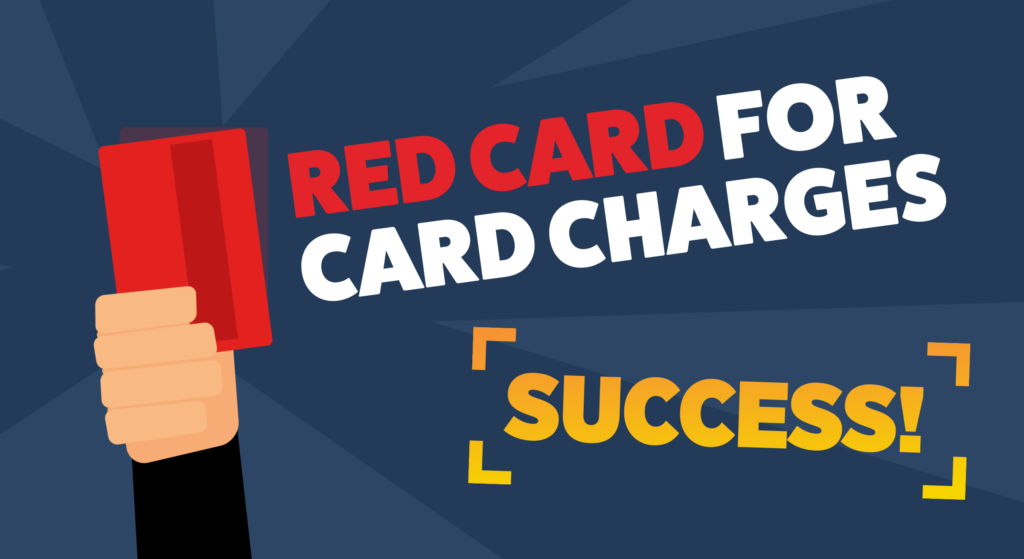We won our campaign to do away with charges for paying by debit or credit card.
About our campaign

What's the problem?
When you're buying a flight or paying for a concert ticket, why do some companies charge you for paying by card? Taking your money is just a part of doing business - and isn't something that we should be charged for.
But this isn't just bad practice. We think that companies who charge high fees for paying by card are breaking the rules. Five years ago, Fairer Finance's founder James Daley ran a campaign at Which? to put an end to unfair card charges. The campaign was a success, and resulted in a new piece of regulation which said companies can only pass on the cost of processing card transactions. They can't charge as much as they like.
That put a stop to most companies charging people who pay by debit card - as these transactions only cost a few pence. But many companies continue to charge high fees for paying by credit card. While the costs of accepting credit cards are higher - they're not nearly as high as the 2% that many airlines have been charging.
And at the end of last year, a European ruling capped something called "interchange fees", which make up the largest part of the costs of paying by credit card. The new cap is 0.3% for credit cards. And while there are a few extra costs above the interchange fee, our experts calculate that these are no more than 0.3% for large companies. So there can be no justification for charging 2% or more.
What's the solution?
We want government agencies to step up and fine companies that are still charging high fees for paying by credit card. Trading Standards should be the first to get involved. But we'd like to see government ministers making it clear that there will be consequences for companies that ignore the rules.
Let's be clear, the worst offenders are not tiny mum and pop businesses. These are large multi-national companies who are cocking a snook at the rules.
We'd also like to see the UK government go further. The European Union is working on rules to ban card charges altogether - and we'd like to see Britain become one of the first countries to implement these. Whether we're in or out of Europe, we don't need to put up with these unfair charges.
Taking customers money is a part of being in business. We don't get charged a "keeping the lights on" fee, so why should we be given an itemised bill for other regular costs?
This isn't just bad practice, it also distorts competition in the market - as customers are led to believe they are going to pay one price, and only realise it's more expensive at the end of the purchase journey. So let's see card charges given the red card once and for all.
Campaign success
November 2016
Virgin Atlantic and British Airways change fees
Virgin Atlantic now don't charge customers for paying by credit card, whilst BA have reduced their fee to 1%.
December 2016
Monarch airline drops credit card fees
Previously charging customers 3% for paying by credit card, Monarch announces it will scrap card booking fees on all tickets.
December 2016
Jet2 drops credit card fees
Previously charging customers 3.25% for paying by Amex, Jet2 is now fee-free for all credit card payments.
January 2017
Cottages.com scraps credit card fees
Inspired by the campaign, Cottages.com scrap their 1.99% credit card charge.
For the media
How you can help
-
1
Report them
Every time you're charged more than 1% by a large company for paying by credit card, take the time to complain to the company and report them to Trading Standards. You can complain via the company's website - or use a free complaints service like our friends over at Resolver.
To report the issue to Trading Standards, contact the Citizens Advice consumer helpline.
-
2
Take them to court
If you're feeling really charged up about the issue (sorry about the pun), why not take the company all the way to the Small Claims Court? It will cost around £25 and will force the company to justify its charges. We don't think companies will be able to justify charges of over 1%, unless they're a small company.
Taking a business to the Small Claims Court is easy and can all be done online. You may not even need to have your day in court - but it's guaranteed to get the company's attention.
-
3
Write to the Minister
The Department for Business, Energy & Industrial Strategy has the power to change the rules and put a stop to unfair card charges. The politician with responsibility for consumer affairs is currently Margot James MP, who is the Parliamentary Under-Secretary of State for Small Business, Consumers & Corporate Responsibility.
Send a letter or email Margot James MP to let her know that it's time for a change in the rules.
-
4
Tweet about our campaign
Let people know that you're supporting Fairer Finance's #redcardforcardcharges campaign, by tweeting about it or posting on Facebook (or any other social media site that takes your fancy).
If you're on Twitter, why not include the minister @margot_james_mp in your tweets?
And let us know about your own experiences of being charged for paying by card. Tweet us @fairerfinance or email us at fairerfinance@fairerfinance.com.
More of our campaigns

Spring 2022
Dignity after death
Support our campaign to make it easier to close accounts and stop charges when a loved one dies

December 2018
Gift cards
Join our campaign to get gift card holders the protections they deserve

Summer 2017
Funeral plans
Support our campaign to get proper protection for consumers buying prepaid funeral plans.
